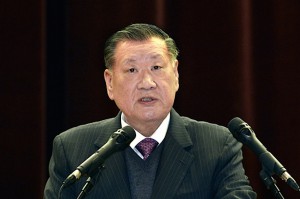After nearly a decade of rapid sales growth, Korean carmaker Hyundai Motor Group could be facing some serious headwinds in the year ahead.
Chung Moon-koo, the chairman of the group that controls both Hyundai and its Seoul-based affiliate, Kia, forecast the group will see its slowest growth in a decade as it deals with increased competition and a weaker global economy.
During a New Year’s speech to employees, Chung predicted the world’s fifth-largest automaker will generate only 2.5% more sales in 2015. He also warned that the Hyundai Motor Group will need to cut costs, increase productivity and take other steps to cope with competition from Japanese makers like Toyota, Nissan and Honda who are benefiting from a cheap yen.
Korean carmakers also had made some major gains due to their own weak currency – as well as a rapid expansion of their product lines. As recently as 2010, Hyundai and Kia reported a combined 24% increase in sales.
(Automakers’ recall woes continue in 2015. Click Herefor the latest recalls.)
But momentum has already slowed – dropping to just 4% sales gain in 2013 and 2014 — in part due to strains on the company’s capacity, most Hyundai and Kia plants around the world reaching their limits. The makers have been reluctant to expand, though Kia last year announced plans to add a new factory in Mexico, a move many expect Hyundai to eventually echo.
Without more capacity the two brands could find themselves losing ground when compared with top brands Toyota, Volkswagen and General Motors, all three of which are closing in on the 10 million annual sales mark. For its part, the Hyundai Motor Group is hoping to sell 8.2 million vehicles in 2015.
Though sales may be slowing, neither Hyundai nor Kia seems to be backing away from their broader strategies. Both have launched a wide array of new models over the last several years, expanding their line-ups from traditional econobox segments up to premium luxury. Kia, for example, added the new K900 last year, a model aimed at the likes of such high-line European products as the BMW 7-Series.
(Click Here for a review of the new 2016 Kia Sorento.)
Hyundai, meanwhile, has made a push into green technologies. Last summer it debuted a new hydrogen fuel-cell version of its Tucson sport-utility vehicle. And it will unveil both hybrid and plug-in hybrid versions of its Sonata sedan at the North American International Auto Show in Detroit later this month.
Despite the need to cut costs, Hyundai Chairman Chung stressed in his speech that the group will increase R&D spending, especially for eco-friendly technologies.
While Hyundai and Kia may see sales level off, especially in key markets like the U.S., there are some bright spots, the executive stressed, pointing to China as a key example. Hyundai is increasing capacity at both of the plants it operates in an alliance with local carmaker BAIC. That move comes even as key rival Toyota falls short of its sales targets in China and is facing the prospect that some of its dealers there may abandon the brand.
(For more on Toyota’s China trouble, Click Here.)


Judging from the continued quality of and innovation in Hyundai products, I’ll continue to bet on Hyundai’s continued success.